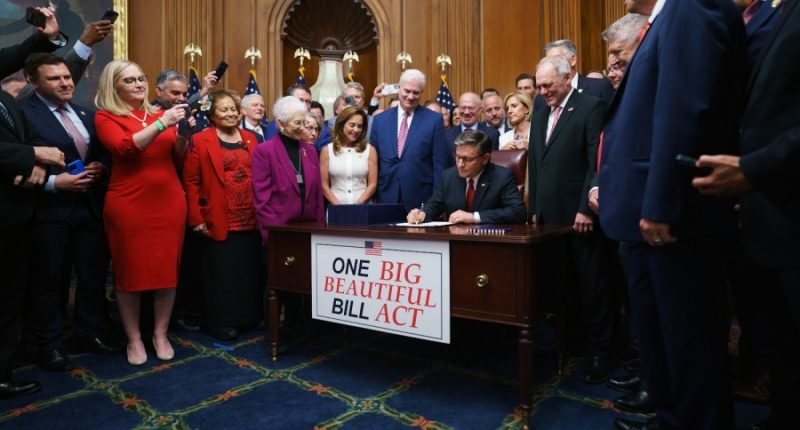Share this @internewscast.com

The “big, beautiful bill” is heading to President Trump’s desk.
On Thursday afternoon, House Republicans successfully passed the central elements of Trump’s domestic policy agenda. This includes extensive tax reductions, stricter immigration controls, support for fossil fuels, and significant Medicaid cuts. After months of intense internal disputes on Capitol Hill, they have managed to push forward what could be a landmark piece of legislation for Trump’s second term.
The vote, which concluded at 218-214, was achieved following over a year of dedicated planning by GOP lawmakers. It required weeks of effort to align differing perspectives among House and Senate Republicans and involved days of last-minute persuasion efforts to unify reluctant members from both legislative bodies.
Ultimately, two Republican representatives, Thomas Massie from Kentucky and Brian Fitzpatrick from Pennsylvania, sided with all Democrats in opposing the bill. This legislation had already secured approval from the Senate just two days prior.
“With one big, beautiful bill, we are gonna make this country stronger, safer and more prosperous than ever before, and every American is going to benefit from that,” Speaker Mike Johnson (R-La.) said during his remarks on the House floor before the vote. “Today we are laying a key cornerstone of America’s new golden age.”
“We’ve had spirited debates, we’ve had months of deliberation, and now we are finally ready to fulfill our promise to the American people,” he added. “That’s what we are doing today.”
The vote followed a marathon, historic speech by House Minority Leader Hakeem Jeffries (D-N.Y.), who commandeered the chamber for 8 hours and 44 minutes to rail against the GOP’s megabill and delay the final vote — surpassing the previous record of 8 hours and 32 minutes set by then-House Minority Leader Kevin McCarthy (R-Calif.) in 2021 as a way to delay action on the Democrats’ social spending and climate package.
The overwhelming Republican support was a reflection of both the enormous appetite within the GOP for extending the 2017 tax cuts and a demonstration of Trump’s immense grip on his party, where loyalty to the president is presumed and defectors risk a career-ending political backlash.
The legislation combines virtually all of the major campaign planks of Trump’s domestic policy platform. In addition to extending the 2017 tax cuts of Trump’s first term, it expands those cuts to eliminate some taxes on tips and Social Security and increase the state and local tax (SALT) deduction cap, which had emerged as one of the thorniest sticking points throughout negotiations.
It gives a $150 billion boost in funding for a border wall, immigration enforcement and deportations. It provides $150 billion in new defense spending for priorities like shipbuilding and a “Golden Dome” missile defense project. It cuts incentives that promote green energy and expands domestic production of oil, coal and natural gas. It will hike the debt ceiling by $5 trillion, forestalling the threat of a federal default.
And it features sharp cuts to low-income health and nutrition programs — reductions designed to help offset the loss of revenues from the tax cuts but that are also expected to eliminate health coverage for millions of people. Even so, the cuts aren’t steep enough to cover the whole tab: The Congressional Budget Office estimates the net effect of the package will be an additional $3.3 trillion in deficit spending over the next decade.
Policy-wise, those provisions will have far-reaching effects across America’s culture and economy that will reverberate for many years to come.
Politically, the legislation may also have drastic and lasting impacts on the power balance in Washington, as both parties aim to highlight the many changes to their advantage in next year’s midterms and far beyond.
Approval of the bill marks a massive victory for Johnson, who coalesced his ideologically diverse GOP conference around the sprawling package by the party’s self-imposed July 4 deadline, despite a series of hurdles hurled his way. It is also a huge win for Trump, who was crucial in getting the bill passed in Congress and will now sign a large chunk of his legislative agenda into law within the first six months of his second term.
The path to passage, however, was no easy trip.
Just a day earlier, the bill appeared to be on life support, largely because of changes made in the Senate. Some moderate Republicans were balking over steep cuts to Medicaid; other centrists were airing gripes over the rollback of green energy tax credits; and conservative spending hawks were hammering the bill for its increased deficit spending. Some vowed, in no uncertain terms, to oppose the package unless it was altered and returned to the Senate.
Hard-line conservatives had even vowed to tank a key procedural vote to open debate on the legislation, which would have left the House floor at a standstill in a massive blow to GOP leaders. Several said they wanted more time to review the policy and discuss it with the White House. Some, however, were holding out hope for changes to the bill — an idea that was adamantly opposed by GOP leaders in the Capitol and the White House since it would have required the package to ping-pong back to the upper chamber.
In the end, however, those threats dissolved under pressure from the White House, which launched a marathon lobbying campaign throughout the day Wednesday and into the morning Thursday that convinced virtually all of the eleventh-hour holdouts to get to yes.
Central to that effort were meetings among Trump, Vice President Vance and a cross-section of wary House Republicans — from hard-line conservatives to moderate GOP lawmakers — who shuttled to the White House on Wednesday morning. Russ Vought, Trump’s budget director, and other top economic officials, visited the Capitol in the afternoon. And the president held a call with some holdouts as they gathered in a room off the House floor at around 1 a.m.
By early evening, resistance was melting away.
Rep. Warren Davidson (Ohio), one of just two Republicans who had voted no on the House version of the bill in June, said he would flip to support the bill.
“One of the other persuasive things was just looking at the Democrats’ reaction to it. Well, maybe the bill is better than I thought,” Davidson said.
As the full-court press took place, Republicans leaders left a pair of five-minute procedural votes open for a combined roughly 14 hours as GOP leaders and White House aides worked behind closed doors to flip the holdouts. One of those votes set the record for the longest vote in the history of the House of Representatives, according to Rep. Jim McGovern (D-Mass.), the ranking member of the House Rules Committee.
The opposition finally dissolved early Thursday morning, as lawmakers shuffled back to the House floor at around 3:30 a.m. to adopt the procedural rule, opening up debate on the legislation and putting the conference on a glidepath to final passage.
In a sign of the tenuous track toward a vote, Johnson — just before 3:30 a.m. — convened GOP holdouts on the floor and prayed with the group. Shortly after, he snapped a photo of the opponents-turned-supporters on the floor. If there was bad blood during the debate, it had turned to elation on the cusp of victory.
The sentiment was not shared across the aisle.
While Republicans cheered passage of the bill — which they dubbed one of the most consequential pieces of legislation in the nation’s history — Democrats hammered the measure as a reverse-Robin Hood “scam” that will slash federal benefits for low- and middle-income people to help pay for tax cuts to the very wealthiest Americans.
Jeffries began his marathon speech by bashing House GOP leaders for allotting only one hour of debate on its contents before the final vote, split into 30-minute segments between the two main committees of jurisdiction. The Democratic leader said he wanted to compensate for what he considers a dearth of discussion, warning Republicans at the outset that he was going to take his “sweet time.”
And he did just that, speaking from 4:53 a.m. until 1:37 p.m., relaying the stories of Medicaid recipients across the country, calling out vulnerable House Republicans for supporting the megabill, and vowing to flip control of the chamber in next year’s midterms.
As the minority party in both chambers, Democrats were powerless to block the legislation on their own, since Republicans moved it on a procedural fast-track that side-stepped the Senate filibuster. But they’re hoping to use the bill as a cudgel against vulnerable Republican lawmakers in next year’s midterms, when they have their eyes set on retaking the lower chamber to act as a check on Trump and the White House.
For now, however, Republicans are closing the book on the current legislative journey, which witnessed several through-the-night votes, bitter fights within the party and at least one history-making moment.
Johnson — who rose from relative obscurity to be the most powerful Republican on Capitol Hill — is holding out hope for some regularity moving forward.
“I do so deeply desire to have just a normal Congress, but it doesn’t happen anymore,” Johnson told reporters at around 1:30 a.m., as it became clear that he would be able to muscle through his marquee measure. “I don’t want to make history, but we’re forced into these situations.”
—Updated at 5:43 p.m. EDT











